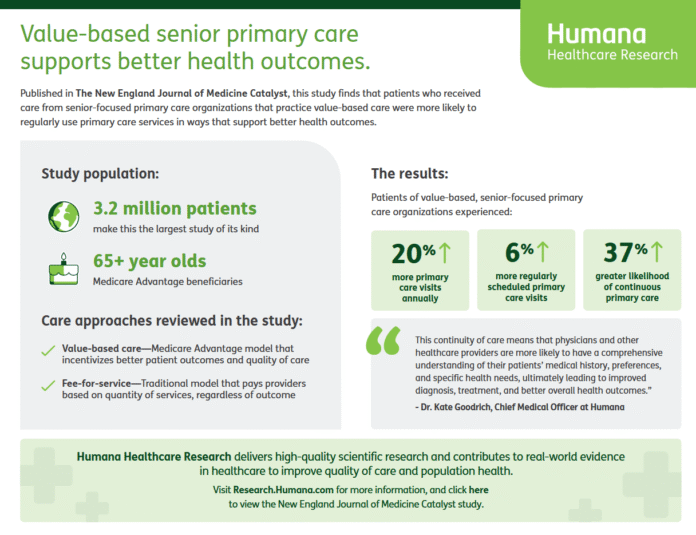LOUISVILLE, Ky.– A new study published in The New England Journal of Medicine Catalyst shows that older adults receiving care from senior-focused primary care organizations that use value-based care models are more likely to have regular and consistent primary care visits compared to those treated under traditional fee-for-service (FFS) arrangements.
The research, conducted by Humana’s Healthcare Research team and Dr. Suhas Gondi of Massachusetts General Hospital, examined data from more than 3.2 million Medicare Advantage beneficiaries across six senior-focused organizations. The findings demonstrate that value-based care, which rewards providers for improving patient health outcomes rather than the number of services delivered, drives stronger primary care engagement.
According to the study, patients of senior-focused primary care organizations had 20 percent more primary care visits annually than those in FFS practices. They also had 6 percent more regularly scheduled visits, and 75 percent of these patients experienced highly continuous care compared to 55 percent of those in FFS arrangements.
“This continuity of care means physicians and care teams have a more complete understanding of their patients’ medical history and needs, ultimately leading to better outcomes,” said Dr. Kate Goodrich, Chief Medical Officer at Humana.
“Consistent, continuous, and high-quality primary care is the foundation of a strong healthcare system,” said Dr. Gondi. “That value-based care can promote this consistency makes it a critical tool in advancing population health.”
Reneé Buckingham, President of Humana’s Primary Care Organization, which includes CenterWell Senior Primary Care, said the study adds to growing evidence in support of senior-focused care. “When we design facilities and care teams around the needs of seniors, we can provide more consistent, personalized, and effective care to help patients achieve their best health,” she said.
The findings build on previous research published in Health Affairs that showed patients in senior-focused primary care models had better access to services compared to those in traditional FFS practices.


